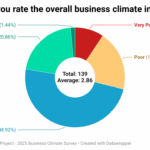Intern Spotlight: Michael Harrington

Name: Michael Harrington
College: University of Vermont
Field of Study: Economics, Film, and Television Studies
Anticipated Graduation: May 2026
Hometown: Colchester, VT
What past or current experiences have prepared you for your internship with the Vermont Chamber of Commerce?
Game Theory with Professor Sara Solnick prepared me the most for my Vermont Chamber of Commerce internship. The course required me to think critically and emphasized the need for rationality and foresight to achieve optimal outcomes. The experience taught me to think ahead and plan for goals I wish to achieve. I use game theory frequently when making decisions to ensure I am making ideal moves at any given time. Additionally, the course was note-heavy. It improved my ability to summarize big ideas in concise sentences, which has been valuable in my internship.
My job as pool supervisor at Myers Memorial Pool also prepared me for the internship. This opportunity improved my communication, teamwork, and time management skills. The job requires me to build a community and interact with patrons, informing them about pool procedures. I am also responsible for ensuring timely lifeguard rotations and making sure everyone on stand is alert. My experience as a supervisor made me more comfortable interacting professionally and personally with new people. In the State House, this has improved my ability to talk to representatives and senators and get involved in the legislative community.
What are you most looking forward to/what do you enjoy the most as part of your internship experience? What skills are you developing?
I enjoy sitting in on the Senate and House committees and listening to the Legislature discuss changes to Vermont state policy. As an economics major, my favorite committees to attend are those that address economic development and Vermont businesses, particularly committee meetings relating to housing. As a Vermont local and current Burlington resident, I have seen the housing crisis expand over the past years and have witnessed its devastating effects on my community. Watching the Legislature’s effort to address this issue is incredible and eye-opening. My note-taking and summarizing skills have also improved drastically throughout my internship.
What are your plans for after college?
I plan to go to law school after I graduate. While I had planned on attending law school before this semester, this internship has opened my eyes to the many paths within law that one can pursue. While I am unsure whether I will work in policy law, this internship has taught me a lot about governance and how bills are made.
Anything else potential employers should know about you?
I enjoy new challenges and always give my best effort.
How should potential employers contact you?
Email: Mickh2414@gmail.com










